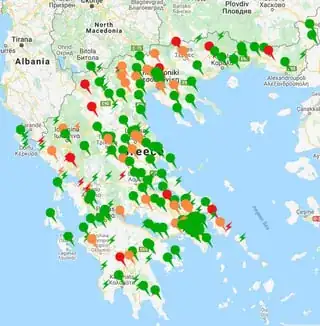Whether any investment makes good financial sense depends on a few factors - let's see how this project lines up:
(1) What are the projected revenues from the investment?
Looks like you have an expectation of how much this will earn you. Is that based on an actual scientific assessment of how much sunlight would hit your proposed installation area? Make sure you aren't simply assuming the energy output based on, for example, a salesperson telling you what to expect.
Do you have actual contracted rates to sell back to your local utility company? This is going to be very jurisdiction dependent. Best case scenario would be a guarantee to buy back electricity at the same cost to use it [meaning they can't undercut what they would pay you compared to what they charge a regular customer].
(2) What are the projected expenses to cover the investment?
Installation you have listed as 5-7k, but does that include the land needed to install it? Perhaps you are installing this on the roof of your house - is that the best way to get sunlight based on direction you face? Is it legal in your municipality to have a structure added like that? Are there permits you might need to buy? Would you need to re-shingle your roof in anticipation of having these installed?
Maintenance will be the big question - do you have assurance over what long-term maintenance will cost? [especially - has this company / technology been around long enough to even know that?]
(3) What are the risks / how likely is your projected outcome?
If you can't get any firm answers on some of the above, then what is the likelihood you are correct? If your revenues are not so guaranteed, you should consider reducing the projected impact of having them.
In a 'worst case scenario' where for whatever reason you are unable to sell the power back to the grid, would this produce more power than you need personally? Would you need to buy some large batteries to store energy, and how long would it take to pay off that additional cost?
(4) What is the 'opportunity cost' of spending that money initially?
You could take that same 5k and invest it, maybe even buying shares in a diversified renewable energy company. Perhaps that has a lower risk, or a higher risk, and a lower return, or a higher return, than doing it yourself. But it would be less of a headache, too.
You could also use that 5k for 'regular' investing, in a diversified index fund or similar, and earn something that way.
The point is that if you project that your solar panels would earn you, say, 5% a year, and the stock market could earn you, say, 7% a year, you need to consider if this is higher risk than the stock market.
In your case, since you plan on doing a software engineering project 'down the road', installing this solar project would cost you 5k that you could even just use to immediately start funding your project.
And, specifically for something like renewable energy:
(5) Are there any government incentives / restrictions to consider?
- It is quite possible your government could give you some type of tax credit for installing renewable energy equipment. That could be a big impact to the profitability of the idea.
At the end of all the above, from a strictly financial perspective, the simplest mechanical way to figure out the $ impact would be: how many years until the investment pays for itself. My understanding of solar projects is that majority of the cost is simply installation, and they can be mostly self-sufficient as long as: (a) little snowfall occurs in your area; and (b) you can very easily sell energy back to the utility grid without negotiating.
In short, how much energy do you expect to produce, what is the price to sell it back to the grid, and therefore how much do you expect to earn per year? Once you know the annual earnings of the investment, consider how many years it would take to pay for itself, and how many years you should expect the panels to last. If it pays for itself in 5 years, and lasts 20 years, for example, that would be one way to see this as valuable investment.
Edit because this has hit Hot, I've done a bit of digging and thrown in some more specific numbers:
I'm relying on a couple of external sources for the following data, see here:
http://www.schellas.gr/en/categories.asp?catid=90
https://www.researchgate.net/publication/261366438_Cost_of_PV_electricity_-_Case_study_of_Greece
In short, it looks like you might be able to get 40MWh of power annually from a very large rooftop installation , like over 800 sq ft [hard to tell exactly because technology has advanced a lot over the past 10 years, so old figures of output may be outdated], unsure of the cost of that installation. Looks like you can sell back to PPC at a cost of about 80 Eur / Mwh, so maybe as much as 3,200 EUR per year, or about 260 EUR per month. Looks like your initial estimate of earning about 300 Eur per month might be possible, and if you could get that installed for 7,000 EUR, it would pay for itself in about 2-3 years.
So at a first pass of reasonability, looks like payoff in 5 years could be possible, assuming you are roughly in the ballpark for installation costs, and have a large enough roof. You will note that this is heavily dependent on technology efficiency and government support for electricity buyback. If the government further promotes the idea great, but if they remove support you might no longer get the return you desire. Definitely looks worth it to investigate further!
